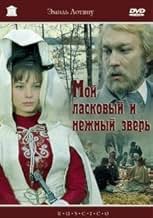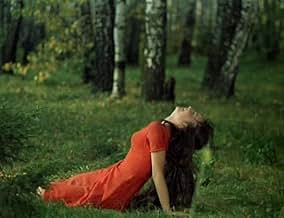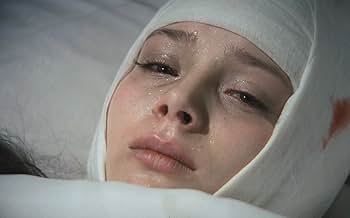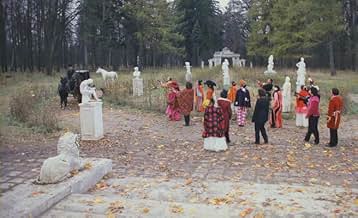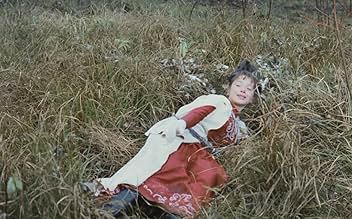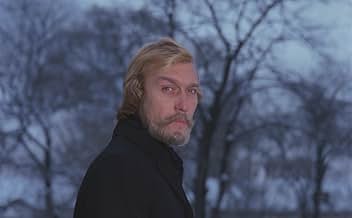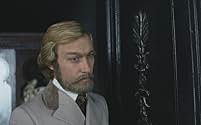AVALIAÇÃO DA IMDb
7,3/10
1,3 mil
SUA AVALIAÇÃO
Um drama romântico em que uma bela mas pobre jovem tem de escolher três pretendentes: um velho viúvo, um conde decadente e um pobre funcionário público.Um drama romântico em que uma bela mas pobre jovem tem de escolher três pretendentes: um velho viúvo, um conde decadente e um pobre funcionário público.Um drama romântico em que uma bela mas pobre jovem tem de escolher três pretendentes: um velho viúvo, um conde decadente e um pobre funcionário público.
- Direção
- Roteiristas
- Artistas
- Prêmios
- 1 indicação no total
Galina Belyaeva
- Olga Skortsova
- (as Galya Belyaeva)
Grigore Grigoriu
- Polikhroniy Kalidis
- (as Grigori Grigoriu)
Vasyl Symchych
- Nikolay Skortsov
- (as V. Simchich)
Olegar Fedoro
- Publisher
- (as Oleg Fedorov)
Aleksandr Zvenigorsky
- Lakey
- (as A. Zvenigorodskiy, Aleksandr Zvenigorskiy)
Anna Petrova
- Sasha Urbenina
- (as Anya Petrova)
Vladimir Matveev
- Volodya Urbenin
- (as Volodya Matveev)
Valeri Sokoloverov
- Polikarp
- (as V. Sokoloverov, Valeriy Sokoloverov)
Georgiy Khasso
- Barin na okhote
- (as G. Khasso)
Galina Ivanova
- Barynya
- (as G. Ivanova)
Amaliya Rozmeritsa
- Barynya
- (as A. Rozmeritsa)
Mariya Zorina
- Sychikha
- (as M. Zorina)
- Direção
- Roteiristas
- Elenco e equipe completos
- Produção, bilheteria e muito mais no IMDbPro
Avaliações em destaque
10Beranto
I'll never forget the wedding waltz (by Evgeny Doga) from this movie... Almost every woman in Russia likes this film and this beautiful music. My grandmother, my mother and my girlfriend like it very much.
10romanm-5
Russian aristocracy in her decadent glamour. Almost every frame is beautifully shot and movie fulfilled with magnificent music. The actors are playing professionally in best tradition of the old Soviet theatrical school. Story is simple. Based on the classic novel. Friendship, love, greed, death and pay-off. The main characters are a young detective, his friend and a beautiful young lady. She seems to be looking for money and enjoys flirting with rich men. Married and fooled old guy and in the same time promising her love to the young one. Her character is more complicated than it seems at first. She, I believe, loves young detective with all her heart but strong desire to be rich and powerful drags her towards old aristocratic money bags. She had been poor all her life and had been dreaming to be in the center people attention since her childhood. The final is dramatic and everybody pays for their sins. A-grade movie. Included in Golden collection of Soviet cinematography.
THE SHOOTING PARTY, aka. A HUNTING ACCIDENT is Soviet filmmaker Emil Loteanu's cinematic interpretation of Chekhov's only full-length, eponymous novel, and the final product is as sumptuously alluring as it is melancholically tedious.
The plot centers around a 19-year-old bombshell Olga (Belyaeva), the daughter of a forester, playing the field between three older men who are besotted with her, Count Karneyev (Lavrov), noble widower Urbenin (Markov) and our protagonist the court investigator Kamyshev (Yankovsky), only the latter she truly loves, but oscillating between financial security and veridical feelings, she makes many a decision against her best judgement, until a hunting accident brings down the curtain on her transient life, but the guilty party gets off scot-free, much obliged to her own withdrawal of the information in extremis.
By meting out punishment to Olga as the token sinner and her husband a scapegoat taking the rap, Chekhov's novel ineluctably hews to that time-honored phallocratic presumption that it is any above-board man's poetic justice to penalize a wanton nymphet, and what rubs salt into the wound is that Loteanu's film is saturated with wandering male gaze and old-money decadence, a combo looks execrably unfashionable to today's ethos (or, on a less militant note, merely to this reviewer's lights).
The fact that a 16-year-old Galina Belyaeva (who would be endowed with the lofty epithet "Russian Audrey Hepburn") would soon be led to the altar by Loteanu, 25 years her senior, echos the director's own possessive infatuation with nubile youth, and their matrimony lasts only 5 years, which says much about the treacherous nature such union implicates.
For all its lyrical longueur, loosey-goosey character arc and an unsavory surplus of machismo that mingled with aristocratic dissipation, THE SHOOTING PARTY has its own merits, both for its production value and aural abundance, not least Eugene Doga's consecrated wedding waltz, and the cacophony invoked by a cohort of Gypsy musicians is so discordant that it is tenaciously embedded in the mind. Also, the cast is good if not great, Belyaeva is an ethereal being, but hobbled by a far too fluid characterization she is an objectified prize up for grabs; Oleg Yankovskiy is typically pronounced in subsisting his concealed passion with four-square resolution, and Kirill Lavrov obviously revels in the count's total abandon with all the theatrics welling up to the fore, yet, they are delectable, alas, the same adjective can barely be referred to Loteanu's own vanity project.
The plot centers around a 19-year-old bombshell Olga (Belyaeva), the daughter of a forester, playing the field between three older men who are besotted with her, Count Karneyev (Lavrov), noble widower Urbenin (Markov) and our protagonist the court investigator Kamyshev (Yankovsky), only the latter she truly loves, but oscillating between financial security and veridical feelings, she makes many a decision against her best judgement, until a hunting accident brings down the curtain on her transient life, but the guilty party gets off scot-free, much obliged to her own withdrawal of the information in extremis.
By meting out punishment to Olga as the token sinner and her husband a scapegoat taking the rap, Chekhov's novel ineluctably hews to that time-honored phallocratic presumption that it is any above-board man's poetic justice to penalize a wanton nymphet, and what rubs salt into the wound is that Loteanu's film is saturated with wandering male gaze and old-money decadence, a combo looks execrably unfashionable to today's ethos (or, on a less militant note, merely to this reviewer's lights).
The fact that a 16-year-old Galina Belyaeva (who would be endowed with the lofty epithet "Russian Audrey Hepburn") would soon be led to the altar by Loteanu, 25 years her senior, echos the director's own possessive infatuation with nubile youth, and their matrimony lasts only 5 years, which says much about the treacherous nature such union implicates.
For all its lyrical longueur, loosey-goosey character arc and an unsavory surplus of machismo that mingled with aristocratic dissipation, THE SHOOTING PARTY has its own merits, both for its production value and aural abundance, not least Eugene Doga's consecrated wedding waltz, and the cacophony invoked by a cohort of Gypsy musicians is so discordant that it is tenaciously embedded in the mind. Also, the cast is good if not great, Belyaeva is an ethereal being, but hobbled by a far too fluid characterization she is an objectified prize up for grabs; Oleg Yankovskiy is typically pronounced in subsisting his concealed passion with four-square resolution, and Kirill Lavrov obviously revels in the count's total abandon with all the theatrics welling up to the fore, yet, they are delectable, alas, the same adjective can barely be referred to Loteanu's own vanity project.
This film takes place in the 19th century countryside in Russia. It's a sort of a suspense story, but more of a tragedy with a beautiful poor country girl and three men who take interest in her.
It's a very nice adaptation of Chekov's story. It's strongly atmospheric and needs concentration to be fully appreciated. If you like a lot of action you'll probably get bored.
Acting is good and cinematography is beautiful, and even if the past is captured very realistically there's also almost a magical feeling to the whole movie.
It's a very nice adaptation of Chekov's story. It's strongly atmospheric and needs concentration to be fully appreciated. If you like a lot of action you'll probably get bored.
Acting is good and cinematography is beautiful, and even if the past is captured very realistically there's also almost a magical feeling to the whole movie.
This has something of the judgement of Paris about the story, only this time it's the impoverished "Olga" (Galena Belyaeva) who has to choose between three men who would have her heart, body and soul. Perhaps the most obvious choices might be the dashing "Kamyshev" (Oleg Yankovskiy), or maybe the elderly count "Karneyev" (Kirill Lavrov) but might she also consider the rather dour widower "Urbenin" (Leonid Markov)? What's clear is that all three would be perfectly happy to have her keep them warm on a winter's night. "Olga" is not, initially at any rate, a temptress, though. She doesn't wish to use any wiles and looks to ensnare anyone, she does genuinely believe that there is hope that she will find true love - and there's a clear candidate from her trio of suitors for that. What chance though? In the end might she, and her family, elect for anything to get them out of the miserably cold poverty in which they live whilst the gentry enjoy their lavish meals, fresh fruit and warming brandy? It's a Chekhov story that's done the rounds over the years, but this adaptation stays a bit truer to the original in that it imbues the girl with a degree of innocence, purity even, and Belyaeva delivers an emotionally nuanced effort that's half Julie Christie and half Ingrid Bergman. The male characters don't fare so well as decent examples of their sex and on that front I found Lavrov to turn in the most engaging effort, especially as the film develops and we all realise that their ancient system of serf and noble is on it's last legs. The production design shows off the opulent decadence in contrast with the more rustic realities well: the gates to the big house that were opened and closed even though there were no walls or fences on either side rather illustrated the fragility of the landed gentry's societal position. At times it is a little too theatrical and can leave it somewhat stilted on occasion, but there are solid efforts from both behind and in front of the camera to tell a story of a recalibration of a society and of a women who wants to make her own choices in life. Oh, and it's a love story too.
Você sabia?
- CuriosidadesThe film was nominated for the Palme D'Or at the Cannes Film Festival.
- ConexõesFeatured in Legendy mirovogo kino: Emil Loteanu
Principais escolhas
Faça login para avaliar e ver a lista de recomendações personalizadas
- How long is The Shooting Party?Fornecido pela Alexa
Detalhes
- Data de lançamento
- Países de origem
- Central de atendimento oficial
- Idioma
- Também conhecido como
- The Shooting Party
- Locações de filme
- Empresas de produção
- Consulte mais créditos da empresa na IMDbPro
- Tempo de duração1 hora 49 minutos
Contribua para esta página
Sugerir uma alteração ou adicionar conteúdo ausente

Principal brecha
By what name was Um Acidente de Caça (1978) officially released in Canada in English?
Responda
